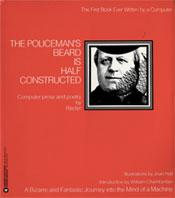The Philosophy of Language: Talking Machines, Poems by Machines and Metaphor in Political Speech
In today’s class we are talking about the philosophy of language. The readings we are looking at challenge the notion that the use of language is simply to represent thoughts in our head or objects in the world. Wittgenstein troubles the notion that language is a neutral, transparent medium for describing the world as well as asking us to think about what it means to mean what you say. Austen highlights the way that some ways of using language also go beyond the descriptive, but are themselves acts. Both readings remind us that we do a number of very complicated things with language. To help us along, here are a couple of examples that touch upon some related ideas.

“Words and chess pieces are analogous; knowing how to use a word is like knowing how to move a chess piece. Now how do the rules enter into playing the game? What is the difference between playing the game and aimlessly moving the pieces? I do not deny there is a difference, but I want to say that knowing how a piece is to be used is not a particular state of mind which goes on while the game goes on. The meaning of a word is to be defined by the rules for its use, not by the feeling that attaches to the words.” Wittgenstein, Cambrige Lectures, 1932-33.
Computers that talk
We spend an increasing amount of time talking with non-humans. Among the most interesting of these are the ‘bots’ that run twitter accounts. According to recent figures, between 5% and 8% of accounts on Twitter are ‘bots’ not people (in the sense of being flesh-and-blood). They sometimes share useful information (like the Netflix account), sometimes interact with people and sometimes with each other. People often follow these twitterbots, or spambots, for the strange and sometimes humorous ways that the use language. But, there are many bots that we don’t recognize as such (or do, but don’t follow for their peculiar answers, such as Siri.) If language is a game, and these computer programs can play this game, can such programs be understood to mean what they say? (NB: here’s an interesting piece about the problem of designing a bot that is a convincing Twitter user.)
This raises some questions about the relationship between language and meaning that echo some of the ideas raised by Wittgenstein and, more proximately, the mid-century pioneer computer scientist Alan Turing (and the ‘turing test’ he developed in the 1960s as a way of defining intelligent machines.)
[Trivia: Wittgenstein and Turing met at Cambridge in the 1930s, but they mostly talked about math and not language.)
Poems by Machines
If your phone/computer/television is thinking when you’re not looking, here is a poem by ractor, a computer program designed in the early 1980s to write poetry:
Bill sings to Sarah.
Sarah sings to Bill.
Perhaps they will do other dangerous things together.
They may eat lamb or stroke each other.
They may chant of their difficulties and their happiness.
They have love but they also have typewriters.
That is interesting.
It was published in a book called The Policeman’s Beard is Half Constructed, which you can download here.
Metaphors in Politics
In recent years, there has been a growing popular interest in the ways that the complexity of language affects social life. The work of George Lakoff has become particularly widely read for his insights into the importance of metaphor and discursive framing in the shaping the way that people respond to political speech (his most well-known book in recent years – at least among those on the left – is Don’t Think of an Elephant.) Here is a clip of Lakoff talking about metaphors of the family in American political speech:
How might we think about Lakoff’s discussion of framing and cognitive linguistics link to Wittgenstein’s notion of language games? Or, drawing on Austin’s discussion, are such statements constative or performative?
Now, moving beyond the example that Lakoff gives, what other ways of using language in social life have a similarly complicated relationship to referring to the outside world?

Comments are closed, but trackbacks and pingbacks are open.